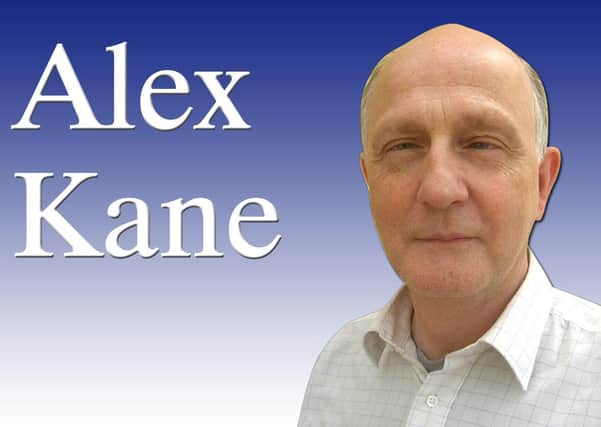Alex Kane: I’ve wasted far too much time on piffling arguments and petty political point-scoring


Computer models will have been constructed and then run and rerun on continuous loop for years as various potential scenarios are graded from best case to worst case. Yet, when the crisis lands on our collective doorsteps (with hundreds of millions, maybe even billions of us self-isolated behind the doors) our reaction will probably be fairly similar to this from Alexander McCall Smith:
‘The unexpected always happens in the way
‘The unexpected has always occurred:


‘While we were doing something else,
‘While we are thinking of altogether
‘Different things – matters that events
‘Then show to be every bit as unimportant
‘As our human concerns so often are.’
For me, aged 64 and part of that older generation which seems to be at greater risk from Covid-19, my immediate reaction was, ‘I thought I would have had more time.’ We all take risks every day; driving our car through rush-hour traffic, boarding a plane, climbing a mountain, taking part in some particularly physical sports, tripping over a kerbstone, falling from a ladder. There are also health risks; a stroke, heart attack, diagnosis of a crippling disease, onset of cancer, dementia, paralysis.
Advertisement
Hide AdAdvertisement
Hide AdBut to some extent all of those are calculated risks. We consider the evidence: yes, we could be killed in a car or plane crash, or break our spine in a rugby scrum. But the calculations are almost always in our favour and we take the risk. And in most circumstances if something very bad happens, short of death, there is a health service and after-care service to help.
But what happens when the calculations are no longer in your favour? What happens when the chances of something potentially life-threatening happening to you rise above 50% to as high as 80% – maybe even higher? What happens when you suddenly realise that tens of thousands of people will certainly die, with many thousands of others left with long-term heart and lung complications? What happens when your freedom of movement is restricted for months on end and you have to acknowledge that either you, a member of the family living in the house with you, or someone from your wider circle of family and friends is likely to die? It makes you think about life, doesn’t it? Makes you think about what really matters to you, too, doesn’t it?
I have accepted that I will probably get Covid-19 within the next few months: it sort of goes with the territory of being an older dad with young children (but even knowing what I know now I wouldn’t have changed any of my decisions over the last two decades; a life lived in fear of what-ifs is, in too many cases, a wasted life). And having accepted that I’m likely to get it – as well as accepting that the odds of survival are not comfortably in my favour – I’ve also realised that too much of my life has been wasted in piffling arguments and petty political point-scoring. There were so many things I planned to do when I was 20, yet haven’t done. All the books I planned to write, but didn’t. All the adventures I’d planned in my head –and yet that’s where they stayed.
Most of all, though, I think of Kerri and the children. The last 20 years have been the happiest of my life. I desperately, desperately hope to still be here when this crisis subsides – as all crises eventually do – if only to spend more time with my children. The books, adventures and politics don’t, in the great scheme of things, seem to matter anymore. I’d push them all aside just to know I could be with Lilah, Indy, Megan and Kerri for a few more years. All life ends, I know that. But, to be brutally honest, I’d be mighty pissed-off to be pushed off this mortal coil by a virion (the technical name for the virus particle) which measures just billionths of a metre across.
Advertisement
Hide AdAdvertisement
Hide AdThe good news – much more important, of course, than my own personal hopes – is that most of us will survive. Life will return to an even keel, even if it turns out to be a different keel. The next few months will teach us unexpected things about ourselves, not least of which is the frailty of our very existence; and the recognition that something which isn’t even visible to the naked eye is, in terms of destructive power, potentially more dangerous than a war or nuclear bomb. It sees everyone and anyone as a potential target. And even when we get some sort of control over the present virus, there will be another one along at some point.
One thing we’ll maybe learn from all of this is, that as a species, we survive together or not at all. I don’t actually mean that in a political sense – because there will always be differences; but it is now clear that certain battles require global responses and global cooperation. We seem to have been caught on the hop with Covid-19 and we must do our best to ensure we’re never caught on the hop again.
On a personal note let me wish all of you the very best over the next few months. Do your best to stay safe and healthy. It will be difficult for all of us and for different reasons. But one thing I have noticed – and it gives me enormous hope, even if I’m not about – is that there is a bedrock of individual compassion, concern, kindness and courage that we don’t see often enough when we think things are ok. I’ll leave you with another few lines from McCall Smith:
‘We wait, knowing that when this is over,
‘A lot of us – not all perhaps –but most,
‘Will be slightly different people,
‘And our world, though diminished,
‘Will be much bigger, its beauty revealed afresh.’